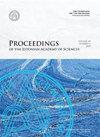家庭护士对高危患者主动管理的认知及相关培训需求的识别
IF 0.7
4区 综合性期刊
Q3 MULTIDISCIPLINARY SCIENCES
引用次数: 0
摘要
. 初级保健是最基本的护理,患者从这里开始他们的治疗之旅。初级保健层面的主动管理通过针对特定患者亚群的主动方法,改善了卫生保健的可及性和质量,改善了卫生保健系统不同层面的护理整合,并改善了患者的预后。本研究的目的是描述家庭护士对高危患者主动管理的看法,并确定进一步的培训需求;因此,采用描述性和实证两阶段的研究设计。第一阶段选取16名家庭护士作为方便样本。这项研究是在爱沙尼亚五个初级保健中心进行的。数据收集于2020年9月至12月,通过修改的慢性疾病护理患者评估(MPACIC)在线问卷收集。获得伦理批准。护士对其对高危患者的主动管理给予积极评价。较高的结果与患者的支持、鼓励、参与日常护理和个人目标设定问题有关。较低的结果与转诊给专业人员、随访、建议具体的健康相关项目和事件有关,这些项目和事件可以使患者受益。作为研究的第二阶段,根据获得的结果制定了培训计划,并对一家初级卫生中心的18名护士进行了培训,该中心自2017年以来一直使用护理管理。人们发现这个培训计划很有用。护士需要对高危患者的主动管理和护理计划有专门的了解,通过系统的培训可以确保这一点。护士感知的主题可以通过定性方法进一步研究。本文章由计算机程序翻译,如有差异,请以英文原文为准。
Family nurses’ perceptions of proactive management of high-risk patients and identification of pertinent training needs
. Primary care is the basic level of care, where patients start their treatment journey. Proactive management at primary care level improves health access and quality of care through proactive approach for specific patient sub-groups, improves integration of care at different levels of the health care system, and improves patient outcomes. The aim of the study was to describe family nurses’ perceptions of high-risk patients’ proactive management and identify further training needs; therefore, a descriptive and empirical two-stage study design was used. A convenience sample of 16 family nurses was recruited in the first stage. The study was conducted at five Estonian primary health centers. Data were collected by Modified Patient Assessment of Chronic Illness Care (MPACIC) online questionnaire between September and December 2020. Ethical approval was obtained. The nurses evaluated their proactive management of high-risk patients positively. Higher results were related to patient support, encouragement, involvement in everyday care, and individual goal setting questions. Lower results were related to referral to professionals, follow-up visits, and suggesting specific health related programs and events from which the patients could benefit. As a second stage of the study, a training program was developed based on the acquired results and training was conducted for 18 nurses at one primary health center, where care management has been used since 2017. The training program was found to be useful. Nurses need specific knowledge about the proactive management and care plan of high-risk patients, which can be ensured through systematic training. The subject of nurses’ perceptions could benefit from further study by qualitative methods.
求助全文
通过发布文献求助,成功后即可免费获取论文全文。
去求助
来源期刊

Proceedings of the Estonian Academy of Sciences
综合性期刊-综合性期刊
CiteScore
1.80
自引率
22.20%
发文量
24
审稿时长
>12 weeks
期刊介绍:
The Proceedings of the Estonian Academy of Sciences is an international scientific open access journal published by the Estonian Academy of Sciences in collaboration with the University of Tartu, Tallinn University of Technology, Tallinn University, and the Estonian University of Life Sciences.
The journal publishes primary research and review papers in the English language. All articles are provided with short Estonian summaries.
All papers to be published in the journal are peer reviewed internationally.
The journal is open to word-wide scientific community for publications in all fields of science represented at the Estonian Academy of Sciences and having certain connection with our part of the world, North Europe and the Baltic area in particular.
 求助内容:
求助内容: 应助结果提醒方式:
应助结果提醒方式:


